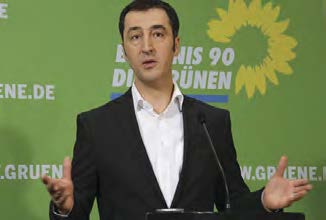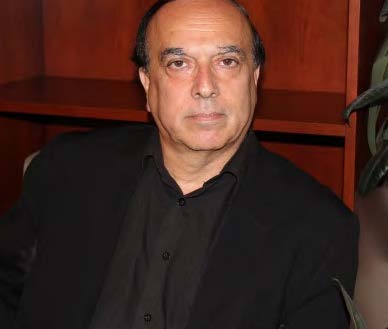Decade after Dink: Cem Ozdemir to Headline Program Honoring Late Journalist
TORONTO — It is hard to believe that 10 years have passed since Turkish-Armenian journalist Hrant Dink was assassinated in cold blood in Istanbul, outside the offices of Agos, the bilingual weekly newspaper he co-founded and for which he served as editor-in-chief.
In the decade since January 19, 2007, one person, Ogun Samast, was charged with his murder. Trials have been ongoing regarding the actual chain of command that led to his death, including both the state and the “deep state.”

Cem Ozdemir
On Sunday, January 22, eight Toronto Armenian organizations will come together to pay tribute to the late Dink one decade since his death. The main speaker for the program will be Cem Ozdemir, the co-chair of the German Greens Alliance Party and a member of the German Bundestag. Ozdemir, a German-born ethnic Turk, was the leading force in Germany’s 2016 Bundestag resolution to officially the Armenian Genocide and acknowledge Germany’s role as an ally of the Ottoman Empire.
Historical context as prepared by the Zoryan Institute about the events before and after Hrant Dink’s murder will be presented. Raffi Bedrosyan will provide the introduction of the keynote speaker.
Bedrosyan is a civil engineer and concert pianist, living in Toronto, Canada. He has donated concert and CD proceedings to infrastructure projects in Armenia and Karabagh, in which he has also participated as an engineer. He helped organize the reconstruction of the Surp Giragos Diyarbakir/Dikranagerd Church and the first Armenian reclaim of church properties in Anatolia after 1915. He gave the first piano concert in the Surp Giragos Church since 1915. He is the founder of Project Rebirth, which helps hidden Islamized Armenians (Hamshens) reclaim their Armenian roots, language and culture, by organizing trips for them from Turkey to Armenia.
Bedrosyan, in a recent interview, said, “Hrant’s murder became a turning point not only for the Armenians, but more so for the peoples of Turkey, starting to question the state version of history; however, the last two years have been a horrible backward reversal in freedom of expression.”
Bedrosyan expressed his pleasure with the speaker.
“This year, I have invited Cem Ozdemir. He was born in Germany but is an ethnic Turk, whose family had emigrated from Turkey to Germany as ‘guest workers.’ Despite all the risks and consequences, Ozdemir and his parliamentarian colleagues defended and passed the resolution. He was a friend of Hrant Dink. He was also greatly influenced by the book Armenian Genocide: Evidence from German Archives, written by German historian, Wolfgang Gust.”
The book was financed by the Zoryan Institute, was translated into English and, Bedrosyan added, “more significantly, into Turkish, helping to awaken more of the Turkish civil society to the historic facts.”
Ozdemir, he added, will explain Dink’s role in his decision to get involved in the Armenian Genocide resolution, and his journey as one of the most prominent human rights advocates in Europe.
To a certain extent, Dink in death was able to unite many people in Turkey — Turks, Armenians, and Kurds — as well as Armenian communities outside and inside Turkey.
Bedrosyan agreed with the assessment, saying, “Hrant’s lifelong quest for dialogue between Turks and Armenians, but based on historic facts, was not well understood while he was alive, not by the Turks, nor, sorry to say, by the Armenians.”

Raffi Bedrosyan
For now, Bedrosyan is pessimistic about the situation in Turkey. “Until Erdogan’s regime disappears, the situation is bad and will become worse.” He added, “The situation for all the ‘others’, i.e. minorities like Armenians, as well as non-Sunni, non-Turk ‘others’ like Kurds and Alevis is very bad, and the level of intolerance, discrimination and racism will increase by the Turkish masses and encouraged by the government.”
Bedrosyan continued, “He was an advocate of dialogue and reconciliation. But dialogue is only useful if both sides are aware of the facts. He did acknowledge that Turks did not know the facts due to brainwashing education system, and therefore, dialogue is not possible yet. He pushed for the democratization of Turkey and freedom of expression before any dialogue can happen. It is too late for any of these concepts to be realized now, unfortunately.”
In the wake of his assassination, more communities rallied to reclaim their heritage, especially the very large Kurdish minority. Now, southeastern Turkey, where the Surp Giragos Church in Diyarbakir was located, and in the past decade reclaimed and renovated, is again a war zone. The church, for which Bedrosyan raised funds extensively and where he played a piano recital, again has been seized by the government, and is well on its way to utter destruction again. As well, the two co-leaders of the HDP party (acronym in Turkish for the People’s Democratic Party), Members of Parliament Selahattin Demirtas and Figen Yuksekdag, have both been arrested.
The minorities who seemed to be able to express themselves, suddenly, will not forget that brief moment of freedom, Bedrosyan said. “They will not forget the brief liberalization. They will lie low and put on hold attempts of liberalization until Erdogan’s regime disappears. One example, the hidden Armenians who have started to return to their Armenian roots do continue their efforts on their own, in touch with my Project Rebirth initiative, but not openly. Until the civil war between Turks and Kurds ends, not much advance is expected.”
Bedrosyan remembers exactly where he was when he heard about the assassination. “I was driving on the freeway when a friend called me with the news. I almost got into an accident from the shock,” he recalled. “He was a close friend. I saw him last in Istanbul during the first Ottoman Armenians conference. My perspective on Turkish Armenian issues and events are now classified as before and after Hrant’s death.”
Bedrosyan is not optimistic regarding real justice for Dink. “It has been 10 years and the trial still continues. The murder was planned, executed and covered up by many people both in the state and the opposing deep state dark forces. Since the state itself is now divided into Erdogan and Gulenist factions, the state is now bringing to justice the Gulenist elements involved in the cover-up.”
There have been positive changes in the wake of Dink’s death. “The civil society in Turkey is definitely more aware and knowledgeable about the Armenian Genocide, unfortunately triggered by Hrant’s death. The government position has not changed and is not expected to change, regardless who is in power, Kemalist, Islamist, liberal or dictatorial. There is a profound fear, paranoia of destroying the foundations of the republic, or losing all the possessions left behind by the Armenians, if any acknowledgment of genocide is considered.”
Concluded Bedrosyan, “For me, remembering Hrant Dink on the anniversary of his assassination is not simply commemorating a slain Armenian journalist, but is continuing his journey toward truth and justice regarding the Armenian Genocide, following his vision of dialogue and reconciliation, based on building a common body of knowledge. That is why in the past years, I have invited to Toronto prominent opinion makers who have shared Hrant’s vision and broke all the taboos in Turkey against the denial of the Armenian Genocide.”
Past invitees have included Taner Akçam, Hrant Dink’s lawyer Fethiye Cetin, who to this day relentlessly pursues the cover ups against Hrant’s murder and is the author of the book My Grandmother, in which she revealed that her grandmother was an Armenian orphan from the Harput region. A third invitee was one of the most respected journalists in Turkey, Hasan Cemal, the grandson of Cemal Pasha, one of the three Ottoman leaders who planned the Armenian Genocide.
The program, which will take place on Sunday, January 22, at 3 p.m., at the Armenian Community Centre, 45 Hallcrown Place, Toronto, is sponsored and organized by the Tekeyan Cultural Association, Nor Serount Cultural Association, Armenian Association of Toronto, Canada-Armenia Business Council, Armenian General Benevolent Union, Bolsahay Cultural Association Toronto, Mekhitarian Alumni Association, Toronto, and Hamazkayin Armenian Educational and Cultural Society “Klatsor” Chapter.

